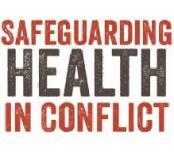
The Safeguarding Health in Conflict Coalition asks the UN Security Council in its upcoming briefing to take three immediate steps to implement Resolution 2286 and protect health workers and services in conflict.
The Safeguarding Health in Conflict Coalition works to protect health workers, facilities, and services threatened by violence due to war or civil unrest. The group of more than 30 international organizations has raised awareness of global attacks on health and pressed United Nations agencies for greater global action to protect the security of health care. The coalition welcomed passage of United Nations Security Council Resolution 2286 in May 2016, which condemns attacks on health and calls for Member States to adhere to international human rights law, develop strategies to prevent attacks, and bring perpetrators of attacks to justice.
Next week, on September 28, the United Nations Security Council will hold a briefing and consultation on Resolution 2286. The meeting provides an opportunity to take key steps to increase protection of health care, including taking measures recommended by UN Secretary-General Ban Ki-moon on August 18.
The urgent need for further Security Council action is underscored by the fact that dozens of attacks were perpetrated against hospitals and health workers in Syria, Yemen, and other countries in conflict around the world since adopting the Resolution.
In the two months following the Resolution, coalition member Physicians for Human Rights documented 15 attacks on medical facilities in Syria alone. These attacks occurred at unprecedented rates—in the last week of July, six hospitals were attacked in Aleppo Governorate, the highest number the region has experienced in a single week since the war began. Médecins Sans Frontières (MSF) reports 19 of its facilities in Syria have been attacked since the Resolution. And just this week on September 20, during the UN General Assembly, a convoy of 18 trucks loaded with vital medical and humanitarian supplies was attacked in Aleppo Governate. According to Physicians for Human Rights, the attack killed approximately 20 people, including aid workers.
These recent deadly attacks are the latest in what is a widespread phenomenon. The Secretary-General, in his annual report on children and armed conflict, found that between January and December 2015, verified attacks on hospitals and health personnel had significantly increased compared with 2014. For example, the report documents that in Afghanistan, attacks on hospitals by parties to conflict resulted in the death or injury of at least 63 health care personnel; additionally 66 health care personnel were abducted and 64 intimidated or assaulted. In Iraq, 10 attacks on health facilities by parties to conflict were reported, while in Yemen this number stands at 59 attacks on 34 hospitals, as some facilities were attacked multiple times.
The coalition’s latest report found that from January 2015 to April 2016, deliberate or indiscriminate strikes on health care killed medical workers and patients, decimated medical infrastructure, and robbed countless civilians of vital medical care in 19 countries around the world.
The Safeguarding Health in Conflict Coalition recommends three key steps toward further action on the Resolution.
- Hold Security Council briefings on specific country situations and initiate fact-finding investigations where warranted. Paragraph 12 of Resolution 2286 calls for briefings by the Secretary-General on the protection of health care in conflict, including reporting of specific acts of violence against medical facilities, transports, and personnel and accountability measures taken. The Security Council should immediately schedule briefings on country situations where health care is under attack, including Afghanistan, Iraq, Nigeria, South Sudan, Syria, and Yemen. The briefings should include information on investigations and accountability steps the relevant Member State has taken. Further, if it is apparent that the Member State has not conducted an adequate investigation or held perpetrators accountable, it should commence an international investigation or commissions of inquiry, as recommended by the Secretary-General in paragraph 30 of his letter, and make referrals to the International Criminal Court as warranted (paragraph 35 of Secretary- General’s letter).
- Urge Member State reporting on steps taken to protect health care. Recommendation 8, paragraph 18 of the Secretary-General’s letter proposed that Member States report on actions to implement Resolution 2286 both as a means to advance protection of health care and to contribute to compilations of best practices. Read together with the Secretary-General’s other recommendations, Member States should report on such matters as steps taken to ratify relevant treaties, adoption of military policies and rules of engagement designed to ensure compliance with obligations to respect and protect health care, trainings of military personnel in such policies and rules and establish oversight mechanisms, the collection data on violations and investigate incidents, and how accountability has been or will be ensured for perpetrators.
- Request the Secretary-General to ensure that UN agencies collect data on attacks and collate such data for public reporting. The Secretary-General’s letter recognized the collection and public reporting of data on attacks on health services as a key element toward developing prevention measures and ending impunity, and the UN’s responsibility for such data collection and dissemination. The Security Council should therefore request that the Secretary-General take necessary steps to ensure that UN agencies that collect such data—such as the Secretary-General’s Special Representative on Children in Armed Conflict, the High Commissioner for Human Rights, and the Office for the Coordination of Humanitarian Affairs—collate and publicly disseminate it. The Secretary-General should require UN agencies to share their data with the WHO in a uniform format to fulfill its responsibilities under resolutions of the World Health Assembly, affirmed by the General Assembly and Security Council, to collect and disseminate data on attacks on health care.
The coalition sent a letter containing the recommendations above to Security Council members on September 21, 2016.

